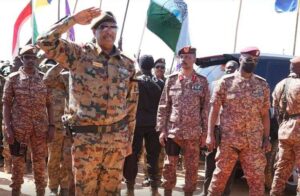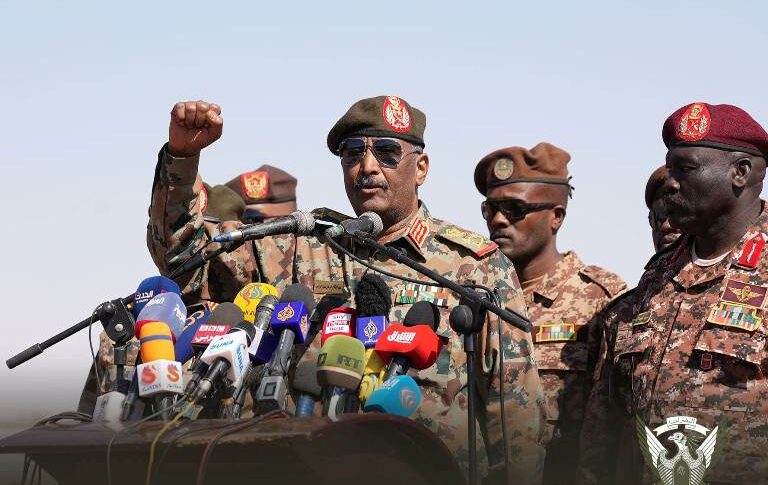Burhan’s speeches at army bases: Preparation for a settlement or fears of a coup?
November 17, 2022 (KHARTOUM) – After the October 25 coup, General Abdel Fattah al-Burhan used to move between military bases, units, and garrisons, giving speeches related to the current political crisis. Sometimes; he speaks about the complicated political situations resulting from his coup, and at other times he talks about the army’s withdrawal from politics and the ongoing talks for a settlement.
Multiple sources within the army confirmed to Sudan Tribune that Burhan’s recent speeches are being developed with the aim of maintaining the unity and cohesion of the army rather than containing political messages. Its main goal is to avoid any external influences on the army.
These speeches, the sources said, are preceded by messages broadcast by his advisers and the Army newspaper in the form of press statements, op-eds or news reports.
Why does al-Burhan prefer talking inside the barracks?

According to Fayez al-Silik the former media advisor to the former Prime Minister, General al-Burhan used to make his political statements inside the army barracks due to his lack of a political base and a social incubator.
Al-Silik told Sudan Tribune that before the coup last year, al-Burhan directed his attacks against the then-ruling Forces for Freedom and Change (FFC) inside his military bases in a clear message indicating that (I have my strength and my gun).
Sudanese journalist Maher Abu al-Goukh went further to say that al-Burhan before the coup “had transformed the armed forces into a party that practices and engages in political action.”
Abu Al-Goukh added that this change appeared clearly from the statements of al-Burhan media advisor, Tahir Abu Haja, or even in the Armed Forces newspaper.
The daily deviated from its purpose as a newspaper specialized in military affairs and moral guidance of the troops. It turned into a mouthpiece of a political party through its positions and the op-ed of its editor-in-chief.
The army has become a political party involved in the political crisis, rather than a national military institution that exercises its duties in a professional manner.
What does the general want to say to his soldiers and adventurers?
Speech from military barracks
Abu al-Joukh believes that al-Burhan political statements from the military barracks and bases have a sense.
He said that recently, specifically since the start of the meetings with the FFC to restore a civilian government, it has become clear that there is an intention to depoliticize the army and prepare them to accept the outcome of the political process currently underway.
“Thus, these meetings are primarily aimed at winning the support of the armed forces and telling them that the ongoing process is in the interest of the armed forces and regular forces,” he added.
For his part, al-Silik says that al-Burhan wanted to repeat the same old messages that “I and the army are in one trench, and our position will remain steadfast so that the political forces should leave the army”.
Al-Silik said that al-Burhan in his speech at Hattab’slast week addressed his army, but intended to send a strongly worded message to the Islamists who put him in trouble twice.
The first was when they were reinstated and consolidated their positions in the civil service as if the revolution had not taken place. The second embarrassment was the public pressure and insult in their articles in which they described him as negligent and weak, also they started talking openly about their contacts with him.
He added that this situation embarrassed him in front of the regional and international community, which does not want the Islamists to return through the army.
Earlier in November, al-Burhan attacked the National Congress Party and the Islamic Movement warning them against infiltrating the army or seeking to use it again to return to power. After that, Islamist leaders detained in connection with the 1989 coup were returned from hospitals to prison. Also, al-Burhan dismissed the head of the Committee to Appeal the decisions of the Empowerment Removal Committee. These decisions have indicated a shift in the political line of the military leaders since the October 25 coup.
Does the general fear a coup?
Al-Silik says that Burhan’s repeated addresses to the military personnel reflect his fear of a coup against him. He said there is no doubt about the presence of Islamist cells in the army, pointing to previous coup attempts by the Islamists after the collapse of the al-Bashir regime.
“They have no choice as they are completely isolated from the street, and their only way to control and preserve what they looted from the state is the military coup,” said Hamdok’s former media adviser.
He added that they supported Burhan’s coup to get rid of the FFC forces and abolish the committee tasked with the dismantlement of their regime. In return, they did not succeed in helping Burhan to consolidate the pillars of his rule.
Abu al-Joukh also did not rule out a coup attempt or al-Burhan’s fear of such a move, pointing out the presence of Islamist officers in the army because he did not purge the military establishment.
Nonetheless, he stresses that the chances of success of a coup under the current multiplicity of armies need the approval of all parties from the army, Rapid Support Forces, armed movements and other formations such as the police and intelligence service.
He stressed that the chances of a successful coup without the consent of any of the previous parties are a recipe for war, and the c coup will not survive.
(ST)

